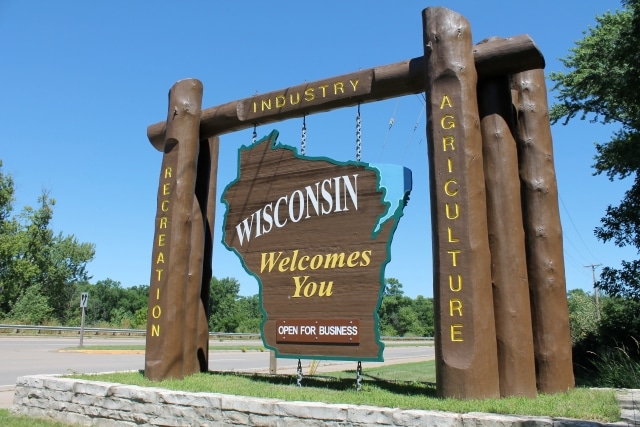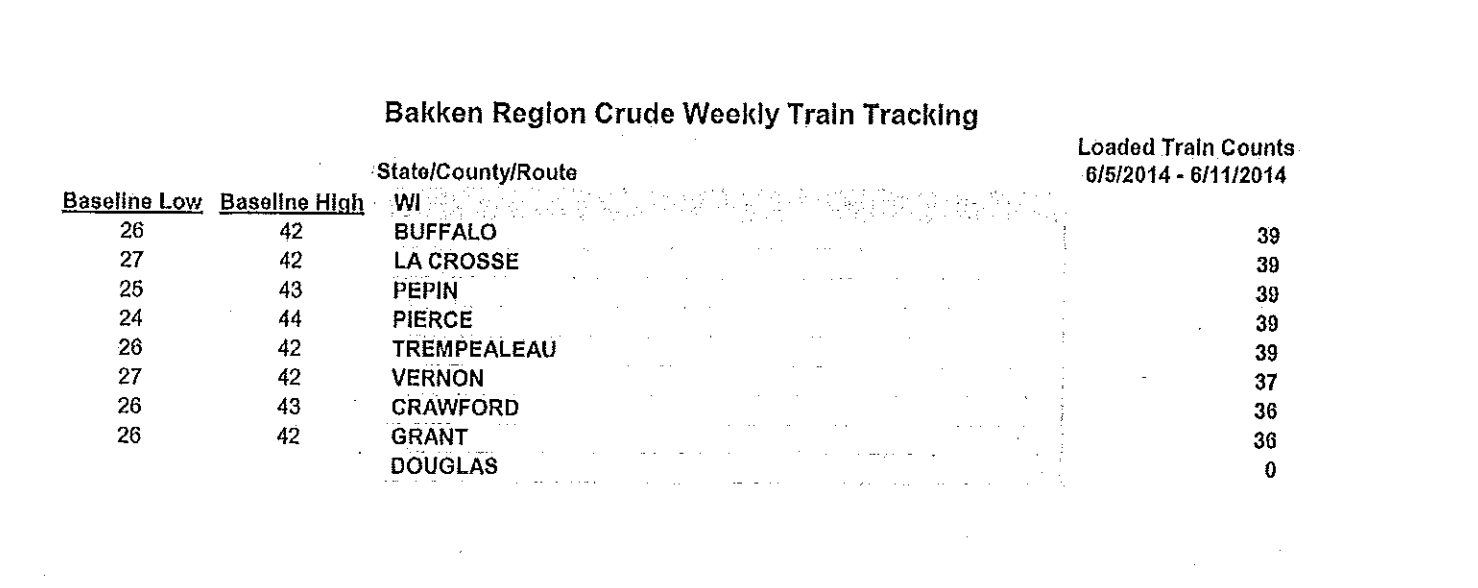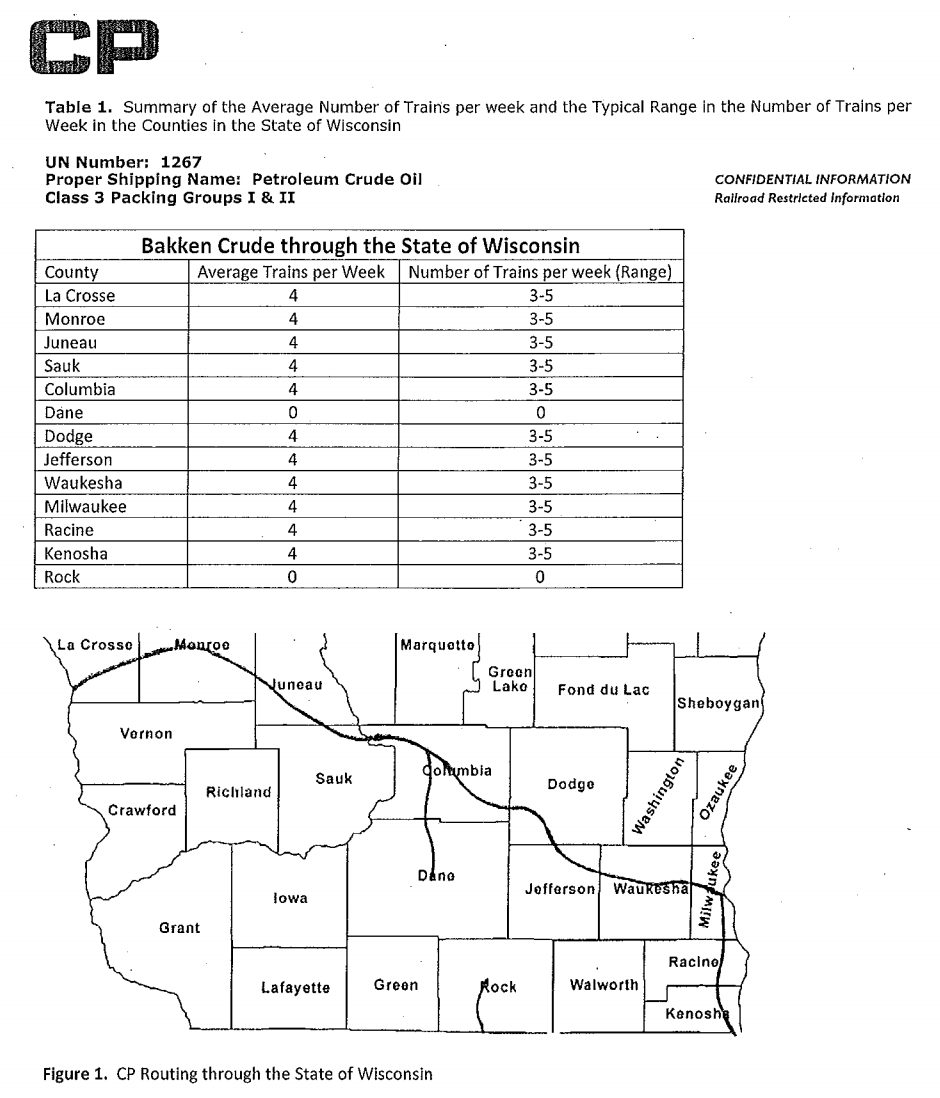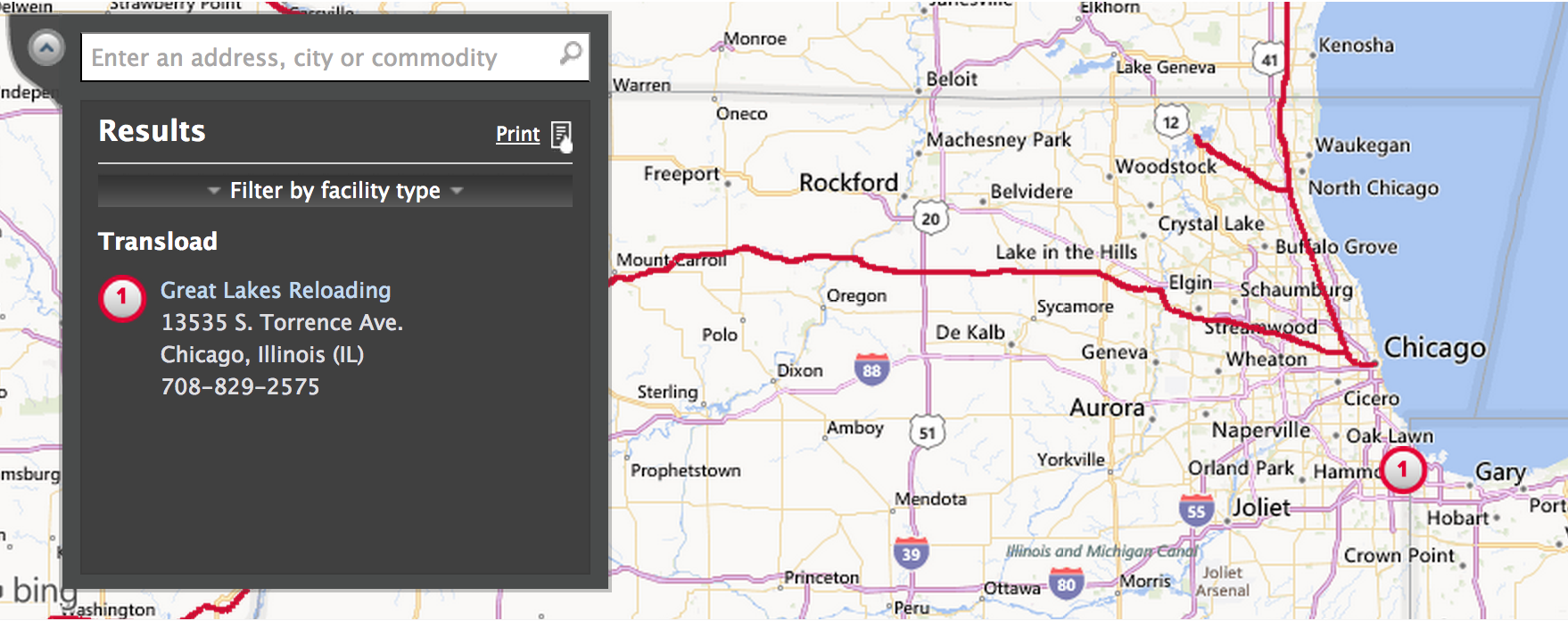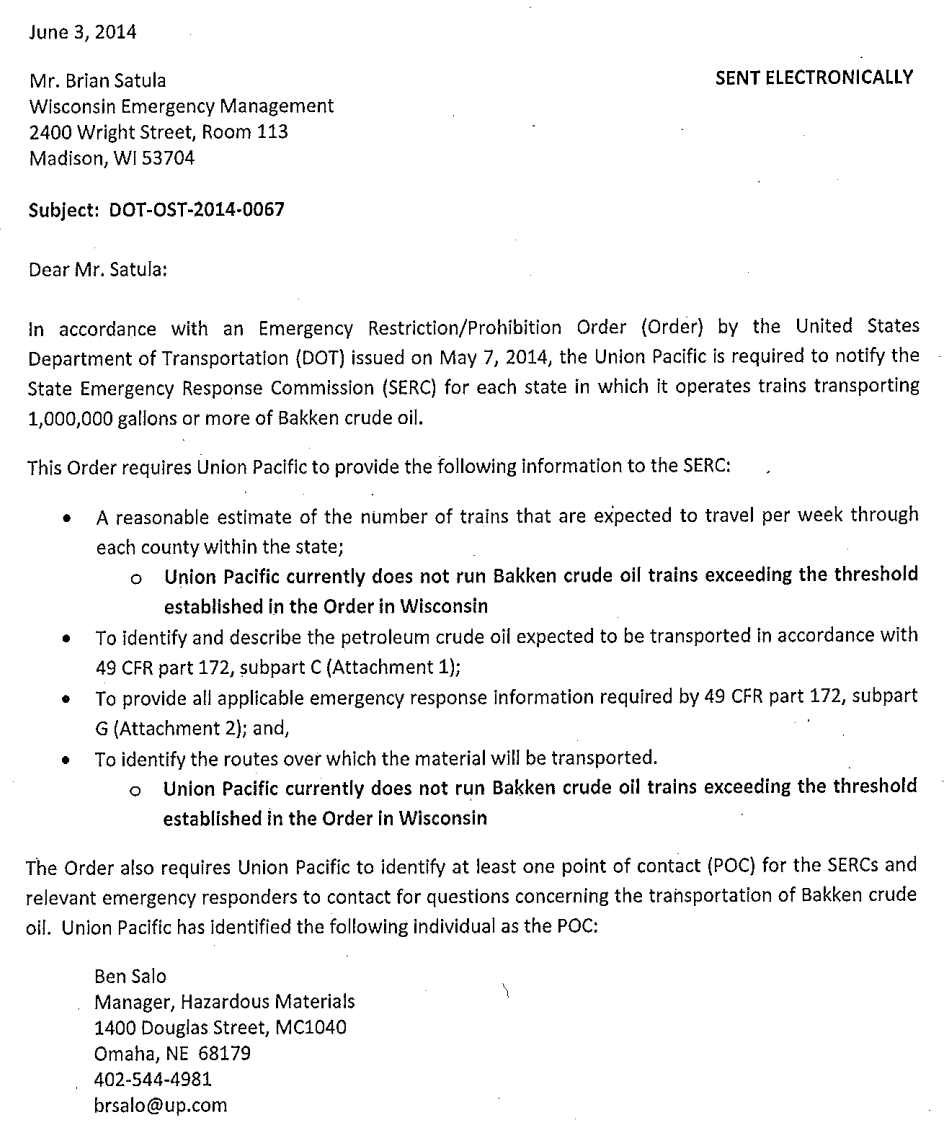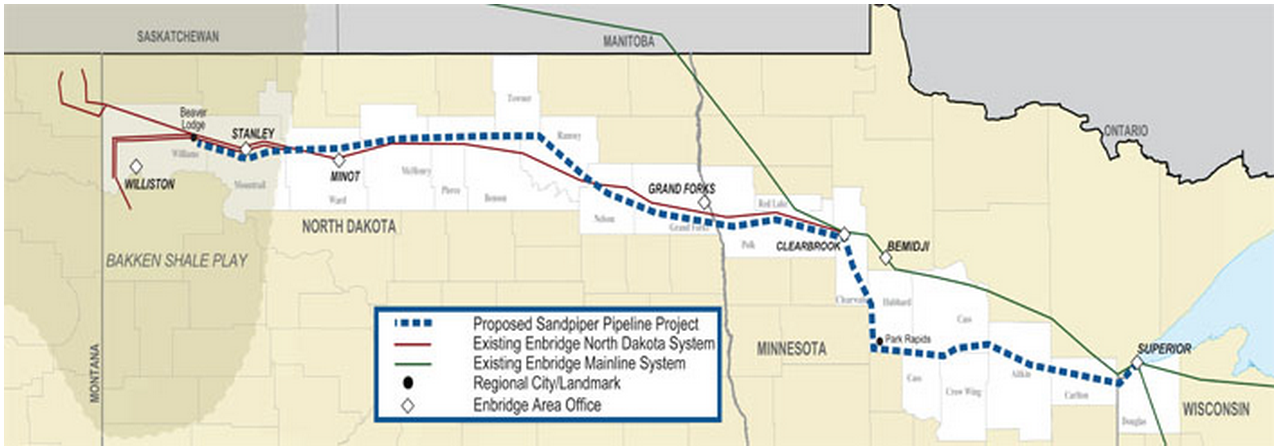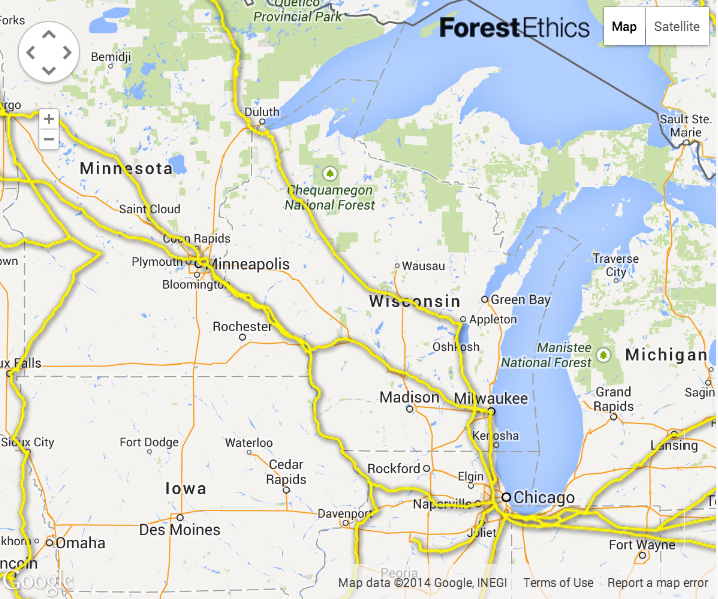DeSmogBlog is publishing the first documents ever obtained from the Wisconsin government revealing routes for oil-by-rail trains in the state carrying oil obtained via hydraulic fracturing (“fracking”) in the Bakken Shale basin.
The information was initially submitted to the U.S. Department of Transportation (DOT) under the auspices of a May 7 Emergency Order, which both the federal government and the rail industry initially argued should only be released to those with a “need to know” and not the public at-large.
The Wisconsin documents show the three companies that send Bakken crude trains through the state — Burlington Northern Santa Fe (BNSF), Union Pacific and Canadian Pacific — all initially argued routes are “sensitive security information” only to be seen by those with a “need to know.”
As covered in a previous DeSmogBlog article revealing the routes of oil trains traveling through North Dakota for the first time, the rail industry used this same line of legal argument there and beyond.
Wisconsin Emergency Management did not buy the argument, though, and released the documents to DeSmogBlog through the state’s Public Records Act.
BNSF Hugs the Mississippi
As with North Dakota, BNSF is the chief mover of oil-by-rail in Wisconsin.
BNSF is owned by Warren Buffett, one of the richest men on the planet and a major campaign contributor to President Barack Obama and expected major donor for Hillary Clinton’s 2016 presidential bid.
Warren Buffett (L), President Barack Obama (R); Photo Credit: Wikimedia Commons
According to the records it submitted to Wisconsin Emergency Management, BNSF moves the majority of its crude-by-rail trains along the state’s western corridor, which hugs the Mississippi River.
For the week of June 5 through June 11, records show BNSF sent 39 oil-by-rail trains through Buffalo County, La Crosse County, Pepin County, Pierce County and Trempealeau County. All of these counties border the Mississippi.
As covered here on DeSmogBlog in January, the BNSF-owned Bakken oil train that exploded in Casselton, North Dakota on December 30, 2013 was headed to a Mississippi River terminal in Missouri owned by Marquis Energy.
Canadian Pacific Hugs Lake Michigan
While BNSF dominates Wisconsin’s Mississippi River corridor, Canadian Pacific does the same — albeit to a much lesser extent — along another major body of water: Lake Michigan.
According to the data submitted by the company, Canadian Pacific ships three to five train-loads of Bakken oil per week through Milwaukee County, Racine County and Kenosha County. Canadian Pacific slices through the heart of the state in a west-to-east transit route to reach Milwaukee County.
Milwaukee, Racine and Kenosha all border Lake Michigan. And once it crosses into northeastern Illinois, the rail line sits in close proximity to Lake Michgan, particularly in Waukegan (a train line traversed many times by this writer, a Kenosha native).
Canadian Pacific owns a major rail transload facility — Great Lakes Reloading — located on the southeast side of Chicago. It sits close to both Lake Michigan and the Calumet River.
Great Lakes Reloading Facility; Photo Credit: Canadian Pacific Railway
Great Lakes Reloading serves as a key thoroughfare for many of the company’s freight rail transportation routes, including for crude-by-rail.
Union Pacific: Didn’t Meet Threshold
Industry giant Union Pacific did not meet the oil-by-rail carriage threshold that requires companies to submit routes to State Emergency Response Commissions (SERCs), one of which is Wisconsin Emergency Management.
That threshold, as explained by Union Pacific in its letter to Wisconsin Emergency Management, is one million gallons of Bakken crude per week.
Union Pacific is perhaps best known to many in southeast Wisconsin and northeast Illinois for its Metra public transit line running from Kenosha to Chicago (and vice versa) and from Chicago to many Chicago-area suburbs (and vice versa).
From America’s Dairyland to Petrostate?
Coined America’s Dairyland as one of the top U.S. producers of dairy-related agricultural products, Wisconsin is increasingly transforming from a Dairyland to petrostate. Oil by rail, one could say, is but the tip of the iceberg of this transformation.
Case in point: Wisconsin is at the epicenter of the global frac sand boom, as covered here in the microdocumentary film, “Sand Land.”
Further, Wisconsin serves as a key frac sand-by-rail hub, with much of the sand actually used to frack the Bakken.
Enbridge’s proposed Sandpiper pipeline, which will carry Bakken oil to Superior, Wisconsin, is another piece of fracking-related infrastructure in Wisconsin.
Enbridge Sandpiper Pipeline; Photo Credit: Enbridge
Not just a key hub of the fracking boom, though, Wisconsin also is home to the front door of Enbridge’s Alberta Clipper pipeline, permitted into existence by President Obama in August 2009. Alberta Clipper also flows into Superior, a key refining hub located in the state along Lake Superior.
Enbridge also now seeks a State Department permit to increase capacity of Alberta Clipper (also known as Line 67), a key piece of the Keystone XL pipeline currently being cloned by Enbridge.
Wisconsin, some would say, is “open for business” — the oil and gas business morphing America’s Dairyland into a full-fledged petrostate.
To find out if you live in an oil train blast zone, visit the hot of the presses website created by ForestEthics.
Photo Credit: dustin77a | Shutterstock
Subscribe to our newsletter
Stay up to date with DeSmog news and alerts


